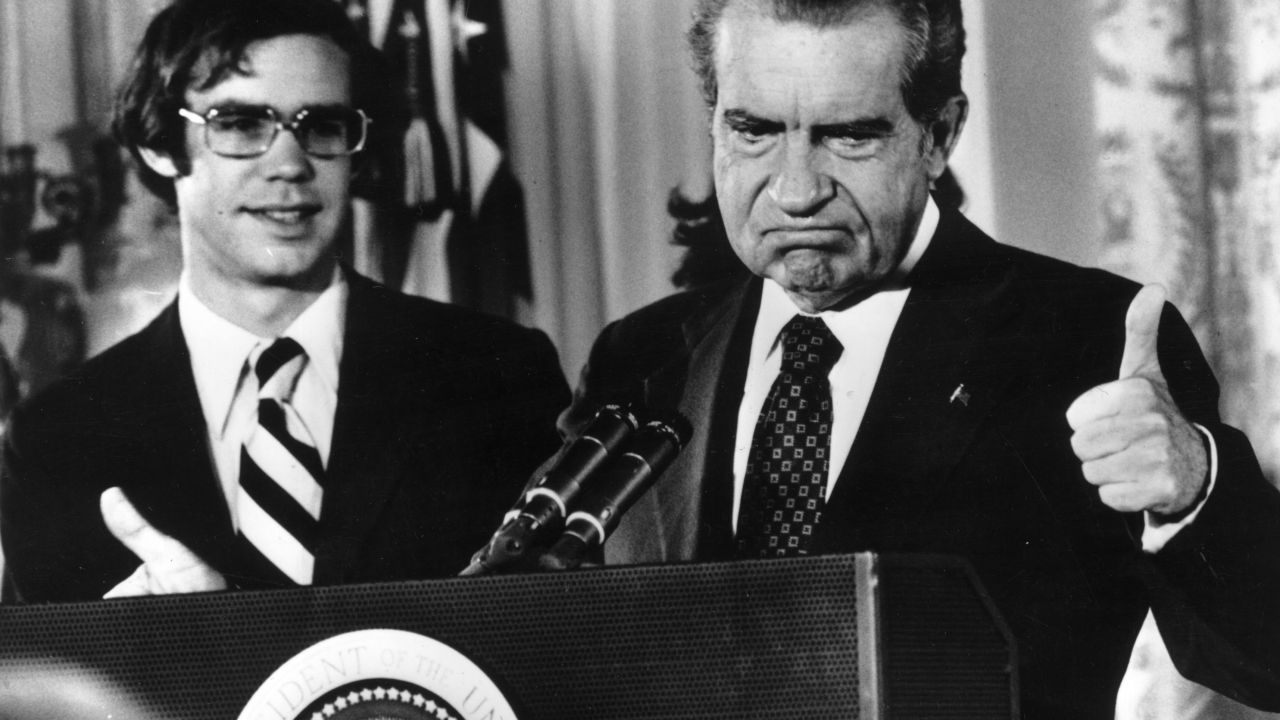
Richard Nixon gives the thumbs up after his resignation as 37th president of the United States. His son-in-law David Eisenhower is with him as he says goodbye to his staff at the White House on Aug.9, 1974. (Photo by Gene Forte/Consolidated News Pictures/Getty Images)
This story originally appeared in Tablet Magazine, at tabletmag.com, and is reprinted with permission.
From a cultural standpoint, the Russia scandal is the opposite of Watergate. Richard Nixon during Watergate was revealed to have commanded a substantial criminal enterprise. This was bad. But mostly it was shocking. He had never presented himself to the public as a gangster. He did have enemies on the left and especially on the radical left, who judged him to be satanically evil, therefore capable of anything. But Nixon had made his career by defeating those people, his detractors and he profited from his victory by introducing himself to America as Republican virtue incarnate, in its Main Street version, with a pet dog and a nice family and cloth coats. So it was a shock to learn about burglars and black-bag jobs. His public took a while to take in the information. But once the facts were established, people felt deceived. The White House tapes showed that he even talked like a gangster, which was shocking to the evangelicals. Ultimately he was driven from office because, like Alger Hiss, he was revealed to be someone other than he seemed to be, and not merely because he had broken laws.
But Donald Trump, who lies about facts, does not lie about himself. During his 2016 campaign he presented himself to the country as strictly the enemy of Main Street Republicanism — not a goody two-shoes, not a nice man, not even a gentleman. He presented himself as an aggressive and loutish savior from outside the American political tradition. Outrageousness was his appeal. His supporters chanted “Lock her up!” precisely because the chant was outrageous: an affront to democracy; an offense to manners; a transgression, therefore a liberation; a chant of glee. Robert Mueller and the intrepid Times and Post reporters may come up with any number of indications that Trump has taken his outrageousness one step too far. But none of this will show that he presented himself falsely to his voters. And if it turns out that he acted on his admiring remarks about Vladimir Putin, if it turns out that his invitation to the Russians to hack Hillary Clinton’s emails was not a joke at all, but was, instead, a knowing gesture, one more moment of gleeful and transgressive honesty at the Trump rallies — well, this will be to his credit. It will prove that his macho posturing was more than theatrical. Besides, Trump’s supporters have every reason to regard the 2016 election as a referendum on Putin. Hiss and the Rosenbergs, whom Trump has oddly invoked, never felt they were traitors because the Soviet Union was our ally, or should have been our ally, and how can it be treasonous to help out an ally? And Trump and his supporters will feel the same way.
Here, then, is a non-Watergate circumstance. Everyone knows by now that everything is true, all of it, even if not everyone has had the courage to say so. There has been a straightforward secret deal to lift the sanctions on Russia in exchange for Russian hackings and internet disinformation capabilities, artfully deployed. We know this to be true because, when every new and old piece of evidence seems to be consistent with a single conclusion, Occam’s Razor takes precedence as a method of deduction over the procedures of Anglo-Saxon jurisprudence, and Occam requires us to presume that all other conclusions are wrong. We know, therefore, even without the impeachment trial that may or may not occur, that Trump’s Russia scandal amounts to the realization of the great fear of the Founding Fathers, which was the subversion-by-corruption of American democracy by democracy’s greatest enemy, the European monarchies — in this case, Europe’s last major dictatorship. By definition, then: a vastly larger matter than anything that came up in Watergate.
But the scandal is historically large mostly because it is not shocking. Trump ran for the presidency promising to perpetrate outrages against the political tradition, and, although he has not built the wall, he has perpetrated the outrages. The scandal, the deep scandal, is that he was, in fact, elected. It is not a secret scandal. It is a public scandal. It is a cultural collapse. It is a spontaneous degeneration. And it has set off a wave of fear — a practical fear among the conventional Republican politicians, who are afraid that, if they speak out against the conspiracy, they will be trampled by Trump’s enraged mob; and a parallel fear among their Democratic counterparts, who do speak out, but are afraid that, if they speak too loudly or too soon, they will likewise enrage the mob; a fear that leads everyone, Republican and Democrat, to tiptoe with the careful pusillanimity of the European politicians of the 1930s. Do we need a sign of how great is the fear? Not a single national politician has delivered a broad and memorable speech on the Trump phenomenon and the Russia conspiracy.
Watergate was a political scandal caused by Nixon and his underlings and by no one else, which meant that, when Nixon was gone, so was the “long national nightmare.” That is not our situation today. Trump could decide on a whim to resign tomorrow, worried perhaps about the Greek tragedy that is descending upon his children. But masses of people will still be yearning deliriously to Make America Great Again — yearning, that is, for an authoritarian leader and a violent political culture. A bigger event than Watergate, then. Deeper, more cultural, more difficult to understand.



